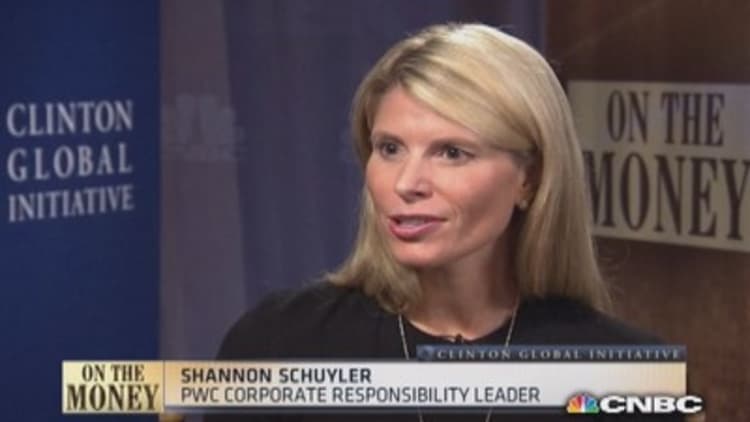The opportunity to invest in a socially responsible way is making a growing number of investors—and their financial advisors—very happy.
Socially responsible investing, often called SRI, refers to "investments or investment strategies that seek to generate a financial return and positive environmental and social benefits," according to the Calvert Foundation, a community development financial institution.
In addition to traditional quantitative analysis, this investment approach incorporates three major components:
- Screening for environmental impact, social impact, and corporate governance (known as ESG)
- Engaging in shareholder activism to encourage corporate citizenship
- Participating in community investing, which directs capital to underserved low-income communities
Read MorePutting your money where your heart is
Kathy Stearns, a certified financial planner and an investment advisor representative with First Affirmative Financial Network, is one of a few advisors nationwide who works exclusively with socially responsible investments.
"The clients I get are so thrilled to find me," she said. "They don't want to be part of the negative aspect of capitalism, but they recognize that they need to take care of their long-term security.
"They tell me, 'I had no idea I could invest in a way that makes me feel good about being an investor.'"
Read MoreAdvisors help with transition stress
Stearns helps clients invest in ways that address their concerns, such as supporting the environment or not supporting defense contractors and purveyors of genetically modified organisms and fossil fuels.
"We get where [the clients] are coming from," said Shane Yonston, a certified financial planner and partner with Blue Summit Wealth Management. "We serve them by being knowledgeable about the many ways to align their portfolios with their values, whether through specialized portfolio managers or mutual funds."
Screening out, screening in
Yonston, also a full-time SRI practitioner, works only with specifically SRI-focused mutual funds. And for clients with individual stocks and accounts, he can screen out investment instruments that contain certain sectors such as tobacco, alcohol, gambling, nuclear power and fossil fuels.
Alternatively, he can "screen in" investments that include sectors such as renewable energy, clean water, organic food, green building, or companies that employ best practices in terms of environmental, social and governance (ESG) issues.
Read More7 industries at risk from climate change
Performance has been very competitive compared to mainstream investments, Yonston said.
"There is a misconception," he said. "People think that by screening out certain companies, you're adversely limiting your universe.
"But this approach looks at quantitative aspects of investments, and also looks at ESG elements which fundamentally make for great, sustainable companies."

Yonston uses SRI-themed products that include:
- Alternative investments, such as REITs based on "green" buildings
- Specialized mutual funds, focused on areas such as women's issues or alternative energy
- Specially screened large cap funds, engaged in shareholder activism
- Municipal bond portfolios, supporting, for example, windmills, solar panels, or even schools
- Community investment notes, which provide micro-lending to underserved communities in the U.S. and other countries
Read MoreAdvisors get hooked on niche clients
A 2012 report from US SIF foundation found that 11.3 percent of assets under professional management in the U.S., or $3.74 trillion, was invested according to SRI strategies, a 22 percent increase since year-end 2009. Most of these assets were held by institutional investors.
The near-term potential for the U.S. retail investor market is $650 billion, according to a 2012 study by the Calvert Foundation.
Barriers
While the Calvert study found that 72 percent of financial advisors surveyed expressed some interest in recommending sustainable investments, there were several barriers to doing so.
These included perceptions of insufficient track records, weak financial performance and insufficient client demand; lack of access to quality research and information; and lack of comfort advising clients on sustainable investments.
There can be confusion as to what constitutes a socially or sustainably responsible investment, said Stearns.
Read More
"There's a continuum," she said. "Starting from what I call 'SRI lite'—such as a fund that might simply not invest in tobacco, but might have defense companies—to a number of funds with a good handful of negative screens, to those investments that employ extensive positive and/or negative screens, active shareholder advocacy and community investing."
One established source for information is The SRI Conference, formerly known as SRI in the Rockies. It is presented by First Affirmative, a registered investment advisor that manages money for clients of the SRI-focused advisors within its network.
Now in its 25th year, the conference serves the national community of SRI practitioners and is often the first point of entry into the SRI discipline, said Steve Scheuth, president and chief marketing officer of First Affirmative. Attendees include broker-dealers, financial advisors, product and service providers, individuals and institutional investors.
"There's a lot of opportunity in this space," he said, adding that he estimates that "only 4 [percent] or 5 percent of licensed investment professionals in the U.S. are actively involved in SRI."
Read More
Two years ago, financial advisor Kerry Castonguay, partner with Chestnut Hill Wealth Management Group, decided to develop his practice to focus exclusively on socially responsible investing. He has been pleasantly surprised by how many of his existing clients have switched over to an SRI focus.
He noticed an interesting reaction from couples.
I'm enjoying my work more, working with like-minded investors. I think [that] 50 years from now, SRI will be standard practice.Kerry Castonguapartner with Chestnut Hill Wealth Management Group
"For the wives, the idea was a no brainer, but the husbands mainly want to know about the returns," he said. "I've also observed that for some [high-net-worth] clients, returns are less important than the purpose their money is being used for."
Following the SRI approach is not just fulfilling for clients, but for advisors, too.
Read MoreCalifornia drought getting grimmer
"I like these people," Castonguay said. "I'm enjoying my work more, working with like-minded investors. I think [that] 50 years from now, SRI will be standard practice."
—By Deborah Nason, special to CNBC.com.





